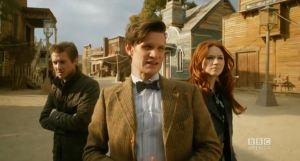‘It’s the year of the blockbuster.’
Following the preview screening of Asylum of the Daleks at Edinburgh’s Filmhouse, as part of the Edinburgh International Television Festival, current showrunner Steven Moffat took to the stage to answer questions initially posed by session host Andrew Collins and then by members of the audience. Here’s a selection of the most interesting.
 You described your first series as a roller-coaster, then the second as a ghost train—can I get you to come up with a phrase for your third series?
You described your first series as a roller-coaster, then the second as a ghost train—can I get you to come up with a phrase for your third series?
Steven Moffat: I’ve abandoned fairground rides for movie posters. When we had the pitch meetings for the various stories, I would say ‘Tell me the movie poster. Tell me the title, what’s on the poster and what’s the log-line… Let’s have a blockbuster every single week, no two-parters, every single week is going to be a blockbuster and let’s not have the cheap episode, let’s just make them all huge.’ It has caused some problems, but I think it has worked really well for us. It’s the year of the blockbuster.
Every year you have to push Doctor Who in a particular direction and see what happens. We want to keep it fresh and exciting and new. Even this new version of the show is getting old… You want to do something each year to make you feel we’re doing something new and something different. Each year should feel different. It shouldn’t arrive and audiences think, ‘Ah, it’s the old cosy, traditional Doctor Who’, we have to make something very different each year, always.
 Some fans prefer wrapped-up single episodes, others like the arc stories. Can you shut out those fan voices and just do what you have to…?
Some fans prefer wrapped-up single episodes, others like the arc stories. Can you shut out those fan voices and just do what you have to…?
The first thing you have to do, as Russell [T. Davies] said when he was doing it back in the beginning, is shut out those fan voices—[to audience] forgive me. You are a fan yourself, so you have to close your own whiney little voice saying ‘but in 1972…’, which goes on all the time, believe me! In the spirit of solidarity, I do sent out messages to fans in the script in ridiculous references to Exxilon and Spiridon. You absolutely have to address the mainstream audience and the kids, people who watch it as families. The funny thing is, if you asked the fans what I should do with their opinions, they would say ‘Ignore us, we want it to be a huge mainstream hit’.
We had 15 years of it being an obscure thing, and people thought we were strange for watching it, so I think they’re very happy with me doing that. In a way, the forums and those obsessive fan conversations, I shouldn’t listen to them, that’s eavesdropping. They should be allowed to complain about Doctor Who. What is the point of loving something if you can’t complain about it incessantly? It’s like all relationships!
 How much of the planning for the series is sitting in rooms with the other writers working things out?
How much of the planning for the series is sitting in rooms with the other writers working things out?
There is a lot of talking, but what we don’t tend to do on this show, which you would do on most shows, is have all the writers in the same room at the same time. I kind of think, that’s not the point of Doctor Who, especially not this year. The point—as I say to every writer that ever comes along to this show—is for them to treat it like they own it, to treat it like it’s theirs. They shouldn’t think this is a democracy, they should think they’re in charge. Every writer who has written a great Doctor Who script has done that.
It’s the same with the directors, like Nick Hurran [Asylum of the Daleks]. They’re very individual. I think that’s a beautifully shot episode, but he went off on his own to do that, and was incredibly creative with it. I think you’ve got to treat it like you own it, so I don’t want them all thinking they’re part of a committee.
In terms of the planning, there are three foreign shoots in the first five episodes, which is sort of ludicrous. The amount of planning in that is epic. That’s continuing to this day, as we’re still making the later episodes for next year’s run. There’s a sense of terror at how behind we are on everything! I cry, ‘Why do we have no money left?’, but looking at that episode I realise, ‘Oh, that’s why!’
In the debate of new ways to watch television [online streaming, YouTube, time-shifting], Doctor Who shows just what ‘old fashioned’ telly can do…
If you count people who time-shift the show later in the same evening, it’s about half or just under half, of the total audience who watch at the time it goes out. We no longer watch television when television schedulers tell us we should, and that’s right. Your bookcase doesn’t tell you when to read a book. A piece of furniture—which is what a television set is—shouldn’t be telling you when you are going to be entertained.
These ‘new’ forms of television are just different ways of delivering the content to the viewer, making it more convenient. I don’t suppose my kids make much of a distinction between YouTube and television. They watch ‘television’ on their computers and they watch YouTube on the television. It’s just a way of watching it: do books really change when you read them on your Kindle?
It’s not such a big deal: it’s exciting, it’s brilliant and it’s convenient, but I don’t think it changes the job of making television. Everyone in this room has probably endured the thing of being out at the shops with your parents being dull, and worrying if you’ll get home in time to see Doctor Who… I’m so happy that children of newer generations don’t have to endure that sadism on behalf of their parents. I don’t think my kids have any notion of scheduling at all, I don’t think they have any notion of television channels even: I think they just watch what they want to watch.
Making Doctor Who gives you a huge responsibility in terms of serving audiences and fans…
Doctor Who is a hugely difficult show to make. The amount of work and stress that goes in to making Doctor Who… I forget every time we embark on it again just how tough it was the last time. It is really tough right now, and it keeps being tough all year round. But, you know what, the responsibility or the demands on you, you never ever worry about that. These days will never come again. It’s amazing and you cannot waste time being apprehensive about it, you’ve just got to get on with it and love it. I can look back on it in the disappointing years to come… reflecting on my great glory days…
Do you think your Doctor Who would have been different if David Tennant or Catherine Tate had stayed with the show, instead of starting fresh with a new Doctor and companion?
Certainly, it would have been different if we’d carried on with the incumbent Doctor, as it were. Y’know, it wasn’t something we embraced with great enthusiasm: it was quite frightening when we realised that the entire cast and the entire behind-the-scenes team were changing over at the same time. It was quite worrying.
Generally speaking, when the Doctor regenerates, there’s someone there for him to prove he’s the Doctor to. It was quite difficult with the Doctor and Amy, because he’s new and she’s new, which is why I had her as a little girl, so there was someone for him to prove his ‘Doctorness’ to. Yes, it would have been different, but Doctor Who is always different and yet always the same. Who knows what would have happened. I tried very hard to get David to stay on, but he said ‘No’. I told him all my ideas, and he left!
Will we see more diversity in the writers on Doctor Who, such as with Neil Gaiman last year, moving outside the usual stable of writers?
We do go outside the circle, but to be perfectly candid it is a difficult balance, it really is. If Doctor Who is the very first television you’ve written—whoever you are—you are going to screw up royally. It is the hardest television show I’ve ever written, and Russell said the same thing, and we’d written hundreds of things before. It’s immensely hard. For the sake of my own sanity, there is a tendency to favour highly experienced television writers. We do go beyond the core writers, but I’m not going to reveal my plans. That’s strictly for maniacs in James Bond films… We do go outside the circle from time to time, because that brings fresh ideas, but it is a tough old job. No brand new TV writer should be tackling this…
How much is Asylum of the Daleks a reaction to the mixed reception given to the new Dalek paradigm seen in Victory of the Daleks?
It’s a more general response to ‘What do we do with the Daleks?’ They just became—and I think I’ve contributed to that—cosier every time. As I’ve said, they became the most reliably defeatable monsters that Doctor Who has. Kids are supposed to be frightened of Daleks, but they take them [the toys] to bed! They’ve become like buses, or taxis or pillar boxes, so the question was ‘Is there a way we can just make them a bit scarier? Can we get them back to being more “monstery”.’ My fondest hope is that now kids will leave their Daleks [toys] outside their bedroom doors… You have to remember that the Daleks are insane tanks!
Would you welcome a bigger budget for the show?
We don’t discuss budgets, as I’d start crying… The schedule and the pressure of trying to make Doctor Who, on any budget, even Avatar’s, is horrific. I’m never, ever going to say I’ve got enough [money]. That’s like asking would you like to be more happy… Of course I’m going to say yes, I want more money. Doctor Who is incredibly well looked after by the BBC, they are incredibly aware of its current jewel status. They know it is not a show that is only successful now. I truly believe that it is a show that will outlive everybody in this room. Everybody—it could carry on that long. It doesn’t just make money now, it will make money forever. I don’t know if you’ve noticed this, but there has been some sort of financial crisis recently… Even within that, Doctor Who is incredibly well looked after. I have no complaints. Except, of course, I’d like more money… and to be happier, thinner, and more handsome.
What’s the reason for the enduring popularity of the character of the Doctor? Is it because audience have turned against the anti-hero and prefer a straight-forward hero figure?
The Doctor has been popular over such a long time because he’s always been a sort of big child… He’s not even a proper hero. He doesn’t have an agenda to go and sort things out. He just wants to go to lunch, or to the beach, or a fairground, and happens to find someone in trouble. I’ve always said he starts every story as a passer-by and by the end he’s the last man standing. He’s not trying to be the perfect hero. He’s not that pompous. He not trying to fix the universe and keep everybody safe at all. He’s honestly just trying to go about his business, but his conscience and hearts will not allow him to see anyone in trouble without trying to help them. He’s far too irresponsible to be a professional hero.
As to the enduring appeal of Doctor Who, it is obviously something I’ve given a lot of thought to. It’s a weird thing, Doctor Who. When kids watch it—and I’m talking particularly about kids because that’s when they begin—they don’t watch it passively. The moment they start watching it, they start inventing their own monsters, their own Doctor costume, possibly their own plan to become the Doctor, their own TARDIS control room… Most shows, you just sit back and watch. This one, people want to actually make it for themselves. Most shows show-off, and say ‘Look how marvellous we are…’. This is the one that says, ‘Go on, have a go…’ In extreme cases, you end up running it!
After all, it is actually true that David Tennant became an actor in order to play the Doctor. I’m not sure he realised it was going to work out quite as well as it did! That’s the enduring appeal of Doctor Who, it’s the one that invites you in, the one that says ‘Come and have a look behind the scenes, come and have a go yourself’. That’s what makes it a national treasure, beyond just being a great television show, it interacts with the rest of its audience. Doctor Who’s got a good demographic: aim a show at absolutely everybody!
On a scale of one to 11, how excited should we be about the 50th anniversary?
50!
Brian J. Robb
Thanks to the Edinburgh International Television Festival, Steven Moffat and the audience at the Filmhouse in Edinburgh.














Which is why Doctor Who Confidential was so great – it did even more to show behind the scenes and encourage kids (of all ages) to have a go.